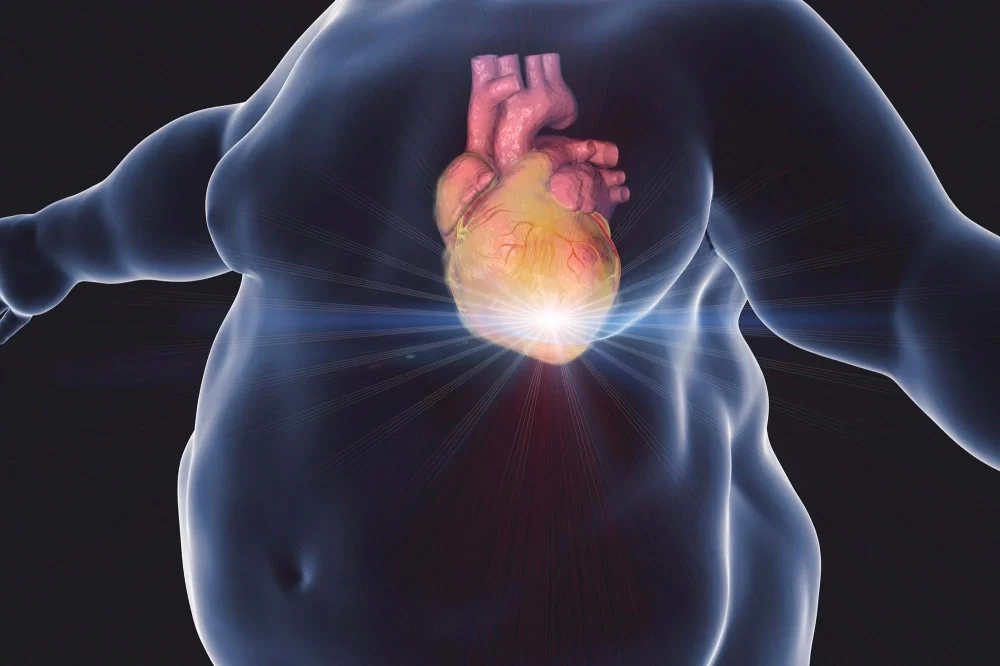The Connection Between Obesity and Heart Disease: Understanding the Risks
As a cardiologist, one of the most common health issues I see in my practice is the impact of obesity on heart disease risk. Over the years, I’ve seen firsthand how excess weight can significantly increase the likelihood of developing cardiovascular conditions like heart disease, high blood pressure, and stroke. In this article, I will explain the connection between obesity and heart disease, the mechanisms behind this relationship, and what can be done to reduce the risk and improve overall heart health.

1. How Obesity Increases the Risk of Heart Disease
Obesity is a major risk factor for heart disease, and the statistics are alarming. According to the World Health Organization, people who are overweight or obese are more likely to develop heart disease than those with a healthy weight. But why does this happen? Let’s explore the physiological processes that connect obesity to cardiovascular problems.
First, excess fat, particularly abdominal fat, can lead to an increase in inflammation throughout the body. This inflammation can damage blood vessels, making it easier for plaque to build up in the arteries, a condition known as atherosclerosis. Over time, this plaque narrows the arteries, restricting blood flow and increasing the risk of heart attacks and strokes.
Second, obesity is closely linked to several other risk factors for heart disease, including high blood pressure, high cholesterol, and type 2 diabetes. Let me share the story of Frank, a 55-year-old patient of mine. He had struggled with his weight for many years and came to see me after experiencing chest pain. After running some tests, we discovered that Frank’s blood pressure was elevated, and his cholesterol levels were high. His obesity was a major contributing factor to these issues, and it was putting tremendous strain on his heart.
Atlanta Heart Specialists
atlanta heart specialists
4375 Johns Creek Pkwy #350, Suwanee, GA 30024, USA

2. The Role of Fat in Heart Disease Development
Fat itself plays a significant role in the development of heart disease. Not all fat is created equal, however. There are two main types of fat: subcutaneous fat (the fat just under the skin) and visceral fat (the fat stored deep in the abdomen, around the organs). Visceral fat is particularly harmful because it produces hormones and chemicals that can raise blood pressure and cholesterol levels, as well as contribute to inflammation in the body.
When people are overweight or obese, they often have a higher percentage of visceral fat, which increases their risk of developing heart disease. This is why it’s not just about the number on the scale—it’s important to consider where the fat is stored in the body. Abdominal fat, in particular, is linked to an increased risk of cardiovascular disease.
Take the example of Sarah, a 42-year-old woman who came to see me with concerns about her weight. She had a BMI in the overweight range, but more importantly, her waist circumference indicated that she had a high level of visceral fat. After discussing her diet and lifestyle, we came up with a plan to address her weight and abdominal fat, which resulted in improvements in her cholesterol and blood pressure levels. Sarah’s case is a prime example of how reducing visceral fat can lower the risk of heart disease.
3. How Obesity Affects Blood Pressure and Cholesterol
Obesity doesn’t just contribute to the buildup of fat in the arteries—it also has a direct impact on blood pressure and cholesterol, both of which are critical factors in heart disease risk. Let’s break down how this happens:
3.1 High Blood Pressure
When a person is obese, their heart has to work harder to pump blood throughout the body. This increased workload can lead to high blood pressure, or hypertension. Over time, high blood pressure can damage the blood vessels, increasing the risk of heart attack, stroke, and kidney disease.
Many of my patients, like Tom, a 60-year-old man, have high blood pressure directly linked to obesity. Tom had been carrying excess weight for years, and despite not having any other symptoms, his blood pressure readings were consistently high. Once we worked on losing weight and improving his lifestyle, his blood pressure dropped significantly, reducing his risk of heart disease.
3.2 High Cholesterol
Obesity is also associated with higher levels of LDL (low-density lipoprotein), also known as "bad" cholesterol. High LDL cholesterol leads to the buildup of plaque in the arteries, further increasing the risk of heart disease. Additionally, obesity can lower HDL (high-density lipoprotein), the "good" cholesterol, which helps clear LDL from the bloodstream.
James, a 50-year-old patient with a family history of heart disease, came to see me for a routine checkup. His cholesterol levels were high, and his weight was a major factor. By incorporating a heart-healthy diet and exercise routine, we were able to improve his cholesterol levels and significantly reduce his cardiovascular risk.
4. Diabetes and Obesity: A Dangerous Combination
Obesity is a major risk factor for developing type 2 diabetes, which in turn increases the risk of heart disease. Excess fat, especially abdominal fat, can make it harder for the body to use insulin effectively, leading to insulin resistance. This condition causes elevated blood sugar levels, which can damage blood vessels and increase the likelihood of heart disease.
Linda, a 55-year-old woman with obesity, was diagnosed with type 2 diabetes. We worked together to develop a plan that included weight loss, a balanced diet, and regular exercise. Over time, her blood sugar levels improved, and she lost weight, reducing her risk of both diabetes-related complications and heart disease.
5. Lifestyle Changes to Combat Obesity and Protect Your Heart
The good news is that heart disease related to obesity is preventable and reversible with the right lifestyle changes. Here are some strategies that can help you combat obesity and reduce your risk of heart disease:
- Healthy Diet: Focus on eating whole, nutrient-dense foods like fruits, vegetables, whole grains, lean proteins, and healthy fats. Limiting processed foods, sugary drinks, and unhealthy fats can help you maintain a healthy weight and lower your heart disease risk.
- Regular Exercise: Aim for at least 150 minutes of moderate-intensity exercise each week. Activities like walking, swimming, cycling, and strength training can help you lose weight, improve cardiovascular health, and reduce inflammation.
- Weight Loss: Even modest weight loss (5-10% of your body weight) can have significant benefits for heart health. It can improve blood pressure, cholesterol levels, and blood sugar control.
- Stress Management: Managing stress through activities like yoga, meditation, or deep breathing exercises can help lower cortisol levels and reduce the impact of stress on your heart.
Working with a healthcare professional to develop a personalized plan that includes these lifestyle changes can dramatically reduce your risk of obesity-related heart disease.
At HeartCare Hub, we understand the challenges of managing obesity and heart disease, and we are here to help you navigate the process. If you’re looking for expert advice on how to protect your heart and improve your overall health, we can guide you toward the best resources and care options tailored to your needs.






















Deborah Heart and Lung Center
deborah heart and lung center
200 Trenton Rd, Browns Mills, NJ 08015, USA